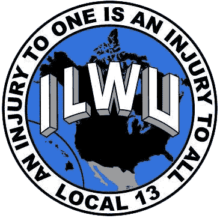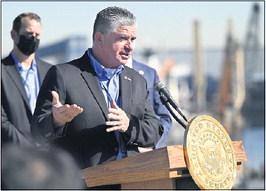By DONNA LITTLEJOHN | dlittlejohn@scng.com | Daily Breeze
PUBLISHED: | UPDATED:
High above the congested Port of Long Beach, where waiting ships, rail cars and stacked containers could be seen through a brown haze, U.S. Sen. Alex Padilla and other officials gathered Friday, Nov. 12, to promise that relief is on the way in the form of the $1.2 trillion bipartisan infrastructure bill set to be signed by President Joe Biden early next week.
Padilla was joined by port and union officials — as well as U.S. Rep. Nanette Diaz Barragan, D-San Pedro, California Transportation Agency Secretary David Kim and Long Beach Mayor Robert Garcia — in a news conference on the roof of the joint Control and Command Center at Pier F in the Port of Long Beach.
The lawmakers earlier met with officials from both the Ports of Los Angeles and Long Beach for a briefing on what is most needed from the federal and state branches to repair the clogged supply chain that has left some store shelves empty ahead of the holiday season and increased pollution as ships idle offshore.
The new infrastructure bill, which includes $17 billion for ports and waterways, will be key to solving the problem, Padilla and the other speakers said.
Some participants said they hoped some of the funding can be fast-tracked, with Padilla suggesting relief could be seen in months, not years.
“The first milestone really starts Monday when the President signs the measure,” Padilla said of the infrastructure bill. “For the Ports of Long Beach and Los Angeles, know that relief is on the way.”
Barragan agreed.
“This is a historic investment in new infrastructure,” Barragan said of the measure. “It couldn’t have come at a better time when we have these supply chain issues and the backlog.”
The lawmakers also lobbied for the companion legislation — the Build Back Better Act — saying it is important to pass the bill because it would address environmental issues.
That legislation, which faces more opposition, would invest more than $550 billion to address climate change, something the speakers said Friday is a key element to the overall infrastructure problem.
Sparked by the pandemic, which began in March 2020, the supply chain crisis has dominated global headlines in recent months.
While initial months of the pandemic brought a sudden drop in cargo at both ports, everything changed by mid-summer when containers began flooding in from Asia, setting historic records. The surge shows no sign of letting up.
Efforts are underway to ease the situation, including a new ship queuing system announced on Nov. 11 and fines set to be levied as early as Monday, Nov. 15, against ocean carriers who leave cargo too long at terminals, taking up valuable dock spaces.
Ramon Ponce de Leon, president of the International Longshore and Warehouse Union Local 13, said containers crowding dock space has slowed the entire process — contributing to a domino effect at virtually every node of the supply chain.
Ships have been lining up along the coast, as far as South Orange County, having to wait days before getting a berth. There’s a shortage of truck drivers and chassis, hamstringing efforts to move containers out of the nation’s two busiest ports. And the vast network of warehouses across Riverside and San Bernardino counties have been pushed to capacity.
“If there’s no land (or warehouse space) to put the goods, (freight carriers) aren’t going to come to pick it up and it ends up staying here on the docks,” he said, adding that it then slows down how many ships can be unloaded. “The docks aren’t made for storage; they’re made for throughput.”
David Kim, secretary of the California Transportation Agency, said the main infrastructure bill the president will sign Monday, Nov. 15, is a “big deal for California.”
“This will enable us to make once-in-a-generation investments,” he said, “to develop and modernize our infrastructure.”.
Funding will be awarded on a competitive basis in grant form, Kim said.
“We are going to aggressively go after these grant funds,” he said. “ We have to compete with others around the country, but we plan to get our fair share and we plan to do well.”
California officials also are looking for state-owned land for staging of the overflow containers, Kim said; an effort meant to free up more dock space to unload ships faster.
“Our priority is making sure folks have what they need for Christmas presents and getting all these goods off ships, out of containers and onto the shelves across the country,” Long Beach Mayor Garcia said. “We’re waking up; it’s an all-hands-on deck moment.”
International Longshore and Warehouse Union Local 13 President Ramon Ponce de Leon speaks at a news conference Friday in Long Beach about the recent passage of the bipartisan infrastructure bill and how it will benefit California’s ports and waterway infrastructure and improve supply chain resiliency.




